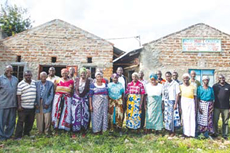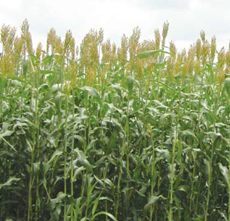When Farmers Adopt New Techniques, Production Multiplies
 Sorghum and Green grams farming is a tradition in Makueni that dates back. Amuka hub from Makueni County in Eastern region Kenya has been growing Sorghum and green grams for many years. But traditional farming practices were not resulting in good yields.
Sorghum and Green grams farming is a tradition in Makueni that dates back. Amuka hub from Makueni County in Eastern region Kenya has been growing Sorghum and green grams for many years. But traditional farming practices were not resulting in good yields.
Amuka hub members planted sorghum, green grams and other cereals on their fields, and they did not use fertilizers resulting in scanty harvests. As sorghum and green grams production is a major source of income for families here, profits from sales were barely covering basic household expenses. This paints a clear picture of the real challenges a Kenyan small holder farmers go through
“Ukulima ulikuwa ngumu. Nilikuwa nalima tu nipate chakula na hata hiyo chakula haikuwa inatosha,” said Serah Kiema member of Amuka hub. Most farmers were exploited by middlemen/brokers who bought their produce at exorbitantly very low prices which didn’t correlate with their expenditure and expected return on investment.
In 2018, CGA’s CVEP began working with the small holder farmers in Makueni to help them improve production and sales. With the support of the project, 68 small holder farmers organized themselves into the Amuka hub. Initial training with the group focused on group dynamics, determining their demand inputs, target markets, good agricultural practices (GAP) and climate smart agriculture (CSA) to enhance agronomic skills and the adoption of climate smart technologies including early planting, use of cover crops, minimum tillage among other CSA practices. Before the onset of the long rains, the hub received more training on engaging in market intelligence, contract farming and negotiating with the available output buyers, grain quality standards, postharvest handling and storage, records keeping, Agripreneurship and financial literacy
“We lacked proper farming skills, used traditional farming method, used poor quality seeds and didn’t have basic knowledge on handling cash. The money gotten from farming was used inappropriately. Our children didn’t go to school due to lack of funds,” explains.
Cereal Value Chain Enhancement Project is a partnership project funded by Christian Aid and implemented by Cereal Growers Association (CGA). The project aimed at developing an inclusive, resilient and sustainable green grams and sorghum value chain that improves the livelihoods of small-scale farmers.
 Before the training, the hub members could harvest less than 3 bags of sorghum in an acre piece of land. With their newly acquired skills and knowledge, members can now easily produce at least 10 bags in an acre and more. Due to this success, through their savings, the members managed to pull their resources together contributing some amount totaling to Kshs. 260,000 which enabled the group purchase a piece of land. A section of the land has been rented to a church which pays Kshs.4000 per month and the money goes to their kitty. The other section the hub have erected a store which they use to store their produce. Additionally, the hub has established a table banking scheme where members save and borrow money in times of need. They pulled together Kshs. 300,000 as a revolving fund. Each money borrowed attracts an interest of 5% of the total money borrowed. The group has also invested in Safaricom shares, built stores and has an operational account with Equity and Kenya Commercial Bank.
Before the training, the hub members could harvest less than 3 bags of sorghum in an acre piece of land. With their newly acquired skills and knowledge, members can now easily produce at least 10 bags in an acre and more. Due to this success, through their savings, the members managed to pull their resources together contributing some amount totaling to Kshs. 260,000 which enabled the group purchase a piece of land. A section of the land has been rented to a church which pays Kshs.4000 per month and the money goes to their kitty. The other section the hub have erected a store which they use to store their produce. Additionally, the hub has established a table banking scheme where members save and borrow money in times of need. They pulled together Kshs. 300,000 as a revolving fund. Each money borrowed attracts an interest of 5% of the total money borrowed. The group has also invested in Safaricom shares, built stores and has an operational account with Equity and Kenya Commercial Bank.
Bulk sales have also allowed the hub to negotiate a higher price for their sorghum and green grams with output buyers, improving profits for members. Contractual farming has enabled the farmers to gain easy access to the markets. Through a partnership with Kenya Breweries Limited (KBL), they are able to sell their sorghum at Kshs.37 instead of Kshs. 27.
Today, my harvest has quadrupled, I have savings that benefits my entire family. This is all thanks to CGA’s CVEP, said Daniel, who is a member of the Amuka hub.
“We don’t have enough words to thank the CGA, our production has drastically improved, our living conditions are better, and prospects are good,” said Samuel Mbuvi.
While many members were skeptical of change in the beginning, more and more members are now applying these news practices.
Through improvements in farming practices, linking to markets and training in business and financial services, 2548 farmers participating in the project made sales totaling over Kshs 8,206,210 through the hubs and a Kshs 867,720 value input sold through the hub. In addition a total of Kshs. 300,000 value of mechanization services done through the hub
Adopted From CGA Media Reports